【精品】初中英语语法知识难点解析(附典题详解及检测附答
最新初中英语语法知识—代词的难题汇编附答案解析

一、选择题1.---When shall we meet again next week?---_____ day is possible. It’s no problem with me.A.Either B.Neither C.All D.Any2.Did you buy ________ in the supermarket?A.anything delicious B.delicious anythingC.something delicious D.delicious something3.I tried two stores for the present I wanted,but ______ of them had it.A.none B.either C.neither D.both4.—Did you buy a large house?—No, not really, at least not as large as ______.A.yours B.your C.you5.—Hi, Jack. Is this your dictionary?—No. is over there. It’s a present from my uncle.A.Mine B.Yours C.My D.Your6.— Is there anything to drink in the fridge? — No, there is _____ left.A.all B.both C.neither D.none7.-Whose CD is it?-Miss Lee always listens to music. It must be________.A.he B.she C.her D.hers8.---Who was knocking at the door just now?---______ was my cousin Andy.A.He B.She C.They D.It9.His name is James but he calls ________Jim.A.his B.himself C.him D.不填10.—John, dinner is ready.—I want to eat _________, Mum. I’m not feeling well.A.something B.anything C.nothing D.everything 11.I don’ t like the color of this shirt. Could you please give me one?A.the other B.others C.another D.other12.I think ______ important to prepare more food for tomorrow’s party.A.that B.it C.this D.us13.The main difference between our brains and those of monkeys is that _____ are bigger. A.we B.ours C.our D.us14.I have tried several jackets, but _________ of them fits me well.A.both B.neither C.all D.none15.As for__________students from Grade 9, the biggest __________ is learning how to take care of ourselves as well as improve our grades.A.us , challenge B.Our, chance C.we , choice 16.Winning or losing is only half the game, __________half is learning how to communicate with your teammates and learning from your mistakes.A.another B.other C.the other17.--- Whose book is this, Jack?-- Oh, it’s ______. I am looking for it everywhere.A.me B.my C.mine D.I’m18.--The story is so amazing! It’s the most interesting story I’ve e ver read.--But I’m afraid it won’t be liked by________.A.everybody B.somebody C.anybody D.nobody 19.—I can’t believe Jim got first in the competition.— As you know, God helps those who help ______.A.yourself B.himself C.yourselves D.themselves20.I need _________bananas to make fruit salad . Could you please buy some ?A.few B.a few C.little D.a little 21.—The books are so nice, which one can I take?—Oh, you can take of them. I’ll keep none.A.both B.all C.neither D.either22.--What about these two coats, madam?--________ of them fits me. Could you show me ________ one?A.Either; other B.Neither; another C.Neither; else D.Either; another 23.The clothes are on sale now. ________ can afford the prices.A.Somebody B.Anybody C.None D.Nobody 24.—The population in China is much larger than _________ in America, right?—So it is.A.that B.it C.those D.one25.----Where would you like to go tomorrow, Beijing or Xi'an?---- is OK. It’s up to you.A.Either B.Neither C.Both D.All【参考答案】***试卷处理标记,请不要删除一、选择题1.D解析:D【解析】【分析】【详解】句意:--我们下周什么时候再碰面?--任何一天都是可以的,我没有任何问题。
初中英语语法难点解析与答疑 (2)

用法:宾语从句 在句子中充当宾 语成分,而定语 从句则充当定语 成分,用于修饰
名词。
结构:宾语从句 和定语从句都有 自己的特定结构, 需要掌握引导词
和句型。
注意事项:在使 用宾语从句和定 语从句时需要注 意时态、语序和 引导词的正确使
用。
虚拟语气和情态动词
虚拟语气:表示与实际情况相反的情况,常常出现在if条件句和wish后的宾语从句 中。
动词的时态和语态
一般现在时:表示习惯性、经常性、普遍性的动作或状态 现在进行时:表示正在进行的动作或状态 现在完成时:表示已经完成的动作或状态,强调对现在的影响 现在完成进行时:表示从过去某个时间开始一直持续到现在的动作或状态
形容词和副词的比较级和最高级
定义:形容词和 副词的比较级和 最高级是英语语 法中的难点之一, 需要掌握如何正 确使用它们。
引导词:宾语从句通常使用that、what等引导词;定语从句通常使用which、that等引导词。
先行词:宾语从句的先行词没有特别限制;定语从句的先行词通常是名词,也可以是代词。
虚拟语气和情态动词的用法有哪些?
虚拟语气:表示与实际 情况相反的情况,常常 用在表达假设、祝愿、 请求等语境中。
情态动词:表示推测、 能力、必要等含义,常 见的情态动词有can、 may、must、should等。
用法:比较级用 于比较两个事物 之间的差异,最 高级用于描述三 者或三者以上中 最突出的一个。
变化规则:形容 词和副词的比较 级和最高级有规 则和不规则的变 化形式,需要牢 记。
注意事项:使用 比较级和最高级 时需要注意语境 和语气,避免产 生歧义或语气不 当。
宾语从句和定语从句
定义:宾语从句 和定语从句是英 语语法中的两种 从句类型,用于 修饰主句中的名
【人教版初中英语】初中英语知识点:初中英语语法重难点专项练习100题及答案(可打印)

【人教版初中英语】初中英语知识点:初中英语语法重难点专项练习100题及答案(可打印)1.Where Uncle Sun yesterday?A. wasB. wereC. didD. does2.They going to see Mr. Sun tomorrow.A. isB. areC. amD. be3.Some are in the river and some are games.A. swiming, playingB. swimming, playingC. swimming, playingD. swimming, playing4.Where is Dick? He to the reading-room.A. has beenB. wentC. has goneD. goes5. Mark Twain, an American writer, everybody here.A. knowsB. is known asC. is known toD. is known for6. I hope he will come to see me before he here.A. leaveB. leavesC. will leaveD. left7. My teacher told me that Australians English.A. spokeB. speakC. speaksD. are speaking8. I think she right now.A. readingB. readsC. is readingD. read9. ---- Where are the children?---- They a good time in the garden.A. are havingB. haveC. have hadD. had10.----- Where my glasses? I can’t find them.---- I them on the bookshelf, but they aren’t there.A. you put, putB. you have put, have putC. have you put, putD. did you put, have put11. When the police arrived, the man for 10 minutes.A. diedB. was deathC. had diedD. had been dead12. By the time this talk is over, we a lot about the earth.A. will be learningB. are learningC. world learnD. will have learnt13. The teachers told me that they me to smooth away the difficulties.A. helpedB. will helpC. helpD. were going to help14. ----Have you seen him today?----Yes, I him this morning.A. has seenB. seeC. will seeD. saw15. He worried when he heard this news.A. isB. wasC. doesD. did16. What’s your friend going next week.A. doingB. doC. doesD. to do17. I don’t think that it’s true. He’s always strange stories.A. tellB. tellingC. toldD. tells18. Have you ever West Hill Farm?A. gone toB. arrivedC. come toD. been to19. How long he the novel?A. has, borrowedB. has, keptC. has, lentD. is, using20. He to do this lessons at eight every evening.A. is beginingB. is beginningC. beginD. begins21. The children a swim this afternoon.A. are going to hasB. is going to haveC. are havingD. are going to have22. There a telephone call for my brother Steven yesterday.A. isB. areC. wasD. were23. he on well with his friends this term?A. Does, getsB. Does, getC. Is, gettingD. Is, geting24. Who away my pen? I can’t find it.A. haven takenB. takesC. has takenD. took25. Shall we football this Saturday?A. playB. playingC. playsD. to play26. The children at school now.A. isB. areC. wasD. were27. Mr. Smith short stories, but he a TV play these days.A. is writing, is writingB. is writing, writesC. writes, is writingD. writes, writes28. He said he the league for two years.A. has joinedB. has been inC. had been inD. joined29. She likes watering trees in the garden, she?A. doesn’tB. don’tC. isn’tD. didn’t30. What you to do to keep the room clean?A. do, haveB. does, haveC. did, haveD. are, have31. Some flowers by Kate already.A. have been wateredB. wateredC. have wateredD. has been watered32. When winter comes, the leaves fall.A. are going toB. willC. will beD. would33. I to the cinema. I there every Sunday.A. go, goB. am going, goC. go, am goingD. am going, am going34. You about the future now, you?A. don’t think, don’tB. aren’t thinking, aren’tC. don’t think, doD. aren’t thinking, are35. He was afraid that he his way.A. would lostB. would loseC. is going toD. shall lose36. We each other since he left here.A. didn’t seeB. hadn’t seenC. haven’t seenD. had seen37. Mr. Smith out for a walk in the park every day.A. is goingB. goesC. wentD. go38. He from home for a long time.A. has gone awayB. had gone awayC. has leftD. has been away39. You mustn’t go to o high, or you dangerous.A. will beB. areC. would beD. is going to40. We have known each other .A. since we were youngB. after we were youngC. when we are youngD. if we are young41. She promised she do better work.A. wouldB. willC. shallD. is going to42. How long has this shop ?A. be openB. been openC. openedD. been opened43. Mr. Smith here since he moved to his city.A. had livedB. have liveC. have livedD. has lived44. ----Have you read the newspaper?----No, I haven’t .A. tooB. yetC. justD. already45. Our knowledge of the universe all the time.A. growB. is growingC. growsD. grew46. She won’t go to the cinema if she the work tomorrow.A. doesn’t finishB. won’t finishC. will finishD. finish47. My grandma for half a year.A. has been deadB. was deadC. has diedD. died48. She to the Great Wall several times.A. goesB. has goneC. wentD. has been49. The earth round the sun.A. moveB. movesC. movedD. will move50. Liu Fengwei three yuan for the lost library book.A. paidB. spentC. costD. took51. I the bike for over four years.A. have boughtB. have buyC. have hadD. bought52. He told us that he that factory the next day.A. had visitedB. has visitedC. will visitD. would visit53. His mother the Party last year. She a Party member for a year.A. joined, wasB. has joined, isC. joined, has beenD. has joined, has been54. We don’t know if it the day after tomorrow.A. will rainB. rainsC. rainedD. would rain55. He said he his life for his country.A. giveB. gaveC. had givenD. would give56. He always to the park on Sunday morning.A. goB. goesC. wentD. is going57. Look, the students to the teacher carefully.A. is listeningB. are listeningC. listenD. listened58. He in this school in 1958.A. taughtB. has taughtC. teachesD. had taught59. They said they to England the next day.A. will flyB. had flownC. would flyD. flew60. They the work in two days.A. had finishedB. would finishedC. is finishingD. will finish61. By the end of last week, we two thousand words.A. would learnB. have learnedC. had learnedD. were learning62. When he left, his mother .A. is cookingB. cookedC. was cookingD. cooks63. We’ll go to play with snow if it tomorrow.A. snowB. snowsC. will snowD. snowed64. There no milk in the glass.A. haveB. hasC. areD. is65. The train when we got to the station.A. has just leftB. had just leftC. leavesD. left66. Dr Smith is not at home. He to work.A. has goneB. has beenC. had beenD. had gone67. That man knows a lot about New York. I heard he before.A. had gone to the cityB. had been in thereC. had been thereD. had been New York68. The artist to Europe. He is there now.A. has goneB. has beenC. had goneD. had been69. Miss Brown said she never to North China before.A. has, goneB. has, beenC. had, goneD. had, been70. What your grandma this time yesterday?A. is, doingB. was, doingC. did, doD. had, done71. I to see the film because I have lost my ticket.A. won’t goB. didn’t goC. don’t goD. haven’t gone72. The students will have a football match if it fine next Saturday.A. will beB. would beC. wasD. is73. She asked me if I the story before.A. have readB. had readC. would readD. will read74. What they at eight yesterday evening?A. are, doingB. did, doC. have, doneD. were, doing75. You can’t see him now because he an important meeting.A. is havingB. haveC. hasD. was having76. I to my brother since last summer.A. didn’t writeB. hadn’t writtenC. haven’t writtenD. don’t write77. Li Ping will visit the Great Wall as soon as he free.A. will beB. isC. wasD. has been78. One day when I the post office I my uncle.A. pass, seeB. was passing, sawC. passed, sawD. pass, saw79. He he some mistakes in the test.A. said, will makeB. said, madeC. said, had madeD. said, make80. They tired so they stopped a rest.A. are, haveB. were, haveC. were, to haveD. are, having81. My father every day.A. takes a walkB. took walkC. take a walkD. is taking a walk82. Mary is seven years old. She eight next year.A. isB. willC. wasD. will be83. A table and many chairs made by him yesterday.A. wasB. wereC. are beingD. was being84. I’ll go with you as soon as I my work.A. will finishB. shall finishC. finishD. finished85. Trees green in spring.A. turnB. turnsC. would turnD. is turning86. Yesterday I in bed all day because I had a fever.A. layB. lieC. laidD. lain87. Hello, Mike. It’s you. I you in Beijing. How long have you been here?A. don’t know, wereB. hadn’t know, areC. haven’t known, areD. didn’t know, were88. A: When again?B: When he . I’ll let you know.A. he comes, comesB. will be come, will comeC. he comes, will comeD. will he come, comes89. The last bus . I had to walk home.A. had goneB. have goneC. wentD. has gone90. A: Are you making cakes? B: .A. Yes, I doB. Yes, I amC. Yes, I’mD. Yes, I’m making91. ----What time ?----My watch .A. it is, stoppedB. is it, has stoppedC. it is, has stoppedD. is it, is stopping92. What on Sunday?A. does he sometimes doB. is he often doingC. has he doneD. is usually he do93. Did you hear someone at the door when you TV last night?A. knock, was watchingB. knock, watchingC. knock, were watchingD. knock, are watching94. That Japanese knows the Salt Lake City. I heard he before.A. a lot of, had been thereB. a lot about, had been thereC. lot, had been thereD. a lot of, had gone there95. As soon as we saw his face, we the news bad.A. knew, wasB. know, wereC. know, wasD. know, were96. Reading English magazines and newspapers helpful to your study of English.A.isB.areC.willD.is going to do97.Mary ,what doing ?A.she isB.are youC.you areD.is98. A: Is this a new radio?B: No,I____it for five years.A. haveB.have hadC.had hadD.will have99.I' m sure he will come to see me before he Beijing.A.will leaveB.is leavingC.would leaveD.leaves100.It seemed that he something expensive.A.have lostB.lostC.had lostD.has losted参考答案1.A2.B3.C4.C5.C6.B7.B8.C9.A 10.C11.D 12.D 13.D 14.D 15.B16.D 17.B 18.D 19.B 20.D21.D 22.C 23.C 24.C 25.A26.B 27.C 28.C 29.A 30.A31.A 32.B 33.B 34.D 35.B 36.C 37.B 38.D 39.A 40.A 41.A 42.B 43.D 44.B 45.B 46.A 47.A 48.D 49.B 50.A 51.C 52.D 53.C 54.A 55.D 56.B 57.B 58.A 59.C 60.D 61.C 62.C 63.B 64.D 65.B 66.A 67.C 68.A 69.D 70.B 71.A 72.D 73.B 74.D 75.A 76.C 77.B 78.B 79.C 80.C 81.A 82.D 83.B 84.C 85.A 86.A 87.D 88.D 89.A 90.B 91.B 92.A 93.C 94.B 95.A 96.A 97.B 98.B 99.D 100.C。
(专题精选)初中英语语法知识—数词的难题汇编附答案解析
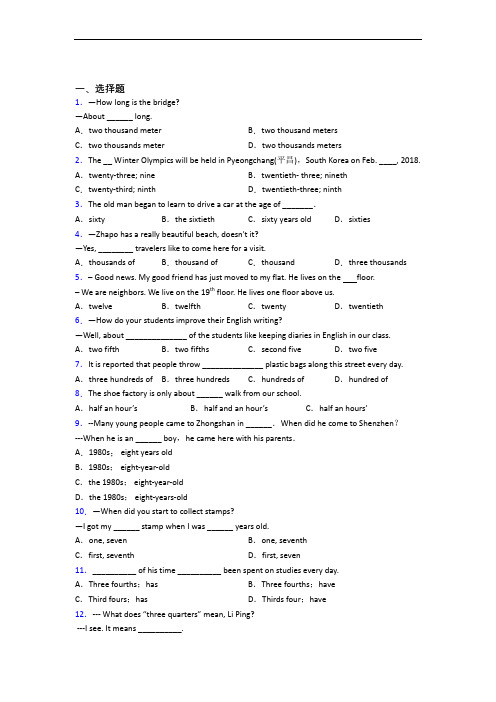
一、选择题1.—How long is the bridge?—About ______ long.A.two thousand meter B.two thousand metersC.two thousands meter D.two thousands meters2.The __ Winter Olympics will be held in Pyeongchang(平昌),South Korea on Feb. ____, 2018. A.twenty-three; nine B.twentieth- three; ninethC.twenty-third; ninth D.twentieth-three; ninth3.The old man began to learn to drive a car at the age of _______.A.sixty B.the sixtieth C.sixty years old D.sixties 4.—Zhapo has a really beautiful beach, doesn't it?—Yes, ________ travelers like to come here for a visit.A.thousands of B.thousand of C.thousand D.three thousands 5.– Good news. My good friend has just moved to my flat. He lives on the floor.– We are neighbors. We live on the 19th floor. He lives one floor above us.A.twelve B.twelfth C.twenty D.twentieth 6.—How do your students improve their English writing?—Well, about ______________ of the students like keeping diaries in English in our class. A.two fifth B.two fifths C.second five D.two five7.It is reported that people throw ______________ plastic bags along this street every day. A.three hundreds of B.three hundreds C.hundreds of D.hundred of 8.The shoe factory is only about ______ walk from our school.A.half an hour’s B.half and an hour’s C.half an hours’9.--Many young people came to Zhongshan in ______.When did he come to Shenzhen?---When he is an ______ boy,he came here with his parents.A.1980s; eight years oldB.1980s; eight-year-oldC.the 1980s; eight-year-oldD.the 1980s; eight-years-old10.—When did you start to collect stamps?—I got my ______ stamp when I was ______ years old.A.one, seven B.one, seventhC.first, seventh D.first, seven11.__________ of his time __________ been spent on studies every day.A.Three fourths;has B.Three fourths;haveC.Third fours;has D.Thirds four;have12.--- What does “three quarters” mean, Li Ping?---I see. It means __________.A.15 minutes B.one third C.fourth three D.three fourths13.Next Friday is my daughter’s birthday. So I will buy her a cake with candles. A.five; fifth B.twelfth; twelve C.nineth; nine 14.We’ve planted ________ trees in the center of our city this year.A.hundred B.hundreds C.hundredth D.hundreds of 15.So far, _______ of the students in our class _______ seen the film.A.three quarters; has B.two fifths; haveC.three quarter; has D.two fifth; have16.This is our _______ school year, we are going to graduate in two months.A.third B.three C.the third17.—How old is your grandpa? He looks energetic.—Yeah, it’s ha rd to imagine he is already in his________ .A.seventies B.seventy C.seventieth D.seventieths 18.---If your parents wanted to have a ______ child, would you agree?---Of course. But they should make it in _____ yeas’ time.A.second; second B.two; two C.second; two D.two;second 19.Lesson ____ is so difficult that it will take them _________ to learn it.A.Sixth; two and a half days B.Six; two days and halfC.Sixth; two and a half day D.Six; two days and a half 20.Thanks to Project Hope, ________ children have better lives.A.thousands of B.thousands C.thousand of 21.—How many people have come to Beijing for the Olympic Games in 2008?—It’s hard to say. _______ people, I think.A.Million of B.Millions of C.Two millions of D.Two million of 22.—Good news! We will have a ________ holiday.—I’ve heard of it. But it’s coming in ________.A.three days; three days’ time B.three days’; three days’C.three-day; three days D.three days; three-day time 23.—Hi, Jack! What about playing soccer after school?—I’d love to, but it’s my grandfather’s ______ birthday and we will have a celebration. A.ninetith B.ninetieth C.nintieth 24.visitors came to take photos of Hongyadong during the vacation.A.Thousand B.Thousand of C.Thousands D.Thousands of 25.Sally, this is ___ time yo u’ve asked me about that matter. What’s wrong with you? A.three B.the three C.the third【参考答案】***试卷处理标记,请不要删除一、选择题1.B解析:B【解析】句意:——那座大桥多长?——大约两千米长。
初中英语重点语法知识点详解及练习题(附答案)
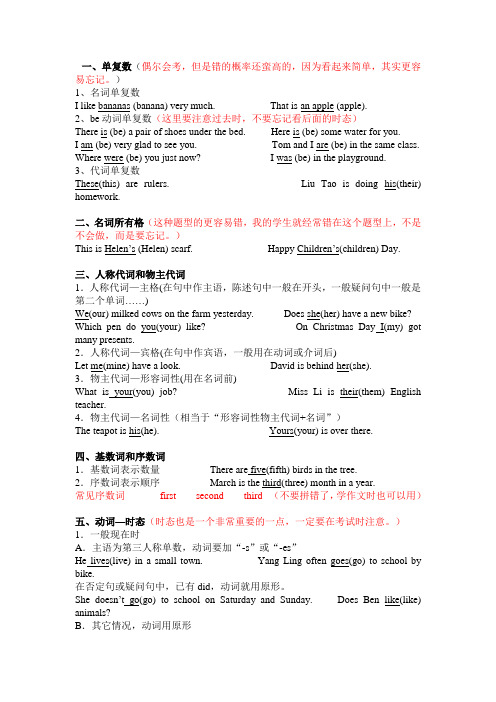
一、单复数(偶尔会考,但是错的概率还蛮高的,因为看起来简单,其实更容易忘记。
)1、名词单复数I like bananas (banana) very much. That is an apple (apple).2、be动词单复数(这里要注意过去时,不要忘记看后面的时态)There is (be) a pair of shoes under the bed. Here is (be) some water for you.I am (be) very glad to see you. Tom and I are (be) in the same class. Where were (be) you just now? I was (be) in the playground.3、代词单复数These(this) are rulers. Liu Tao is doing his(their) homework.二、名词所有格(这种题型的更容易错,我的学生就经常错在这个题型上,不是不会做,而是要忘记。
)This is Helen’s (Helen) scarf. Happy Children’s(children) Day.三、人称代词和物主代词1.人称代词—主格(在句中作主语,陈述句中一般在开头,一般疑问句中一般是第二个单词……)We(our) milked cows on the farm yesterday. Does she(her) have a new bike? Which pen do you(your) like? On Christmas Day I(my) got many presents.2.人称代词—宾格(在句中作宾语,一般用在动词或介词后)Let me(mine) have a look. David is behind her(she).3.物主代词—形容词性(用在名词前)What is your(you) job? Miss Li is their(them) English teacher.4.物主代词—名词性(相当于“形容词性物主代词+名词”)The teapot is his(he). Yours(your) is over there.四、基数词和序数词1.基数词表示数量There are five(fifth) birds in the tree.2.序数词表示顺序March is the third(three) month in a year.常见序数词first second third (不要拼错了,学作文时也可以用)五、动词—时态(时态也是一个非常重要的一点,一定要在考试时注意。
初中英语语法重难点解析知识点归纳
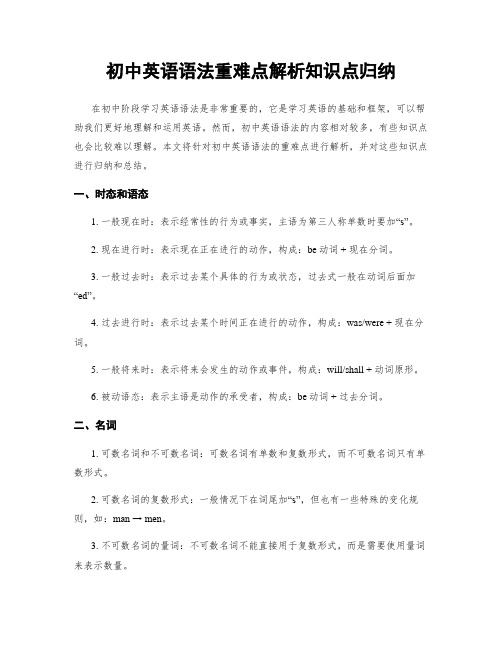
初中英语语法重难点解析知识点归纳在初中阶段学习英语语法是非常重要的,它是学习英语的基础和框架,可以帮助我们更好地理解和运用英语。
然而,初中英语语法的内容相对较多,有些知识点也会比较难以理解。
本文将针对初中英语语法的重难点进行解析,并对这些知识点进行归纳和总结。
一、时态和语态1. 一般现在时:表示经常性的行为或事实,主语为第三人称单数时要加“s”。
2. 现在进行时:表示现在正在进行的动作,构成:be动词 + 现在分词。
3. 一般过去时:表示过去某个具体的行为或状态,过去式一般在动词后面加“ed”。
4. 过去进行时:表示过去某个时间正在进行的动作,构成:was/were + 现在分词。
5. 一般将来时:表示将来会发生的动作或事件,构成:will/shall + 动词原形。
6. 被动语态:表示主语是动作的承受者,构成:be动词 + 过去分词。
二、名词1. 可数名词和不可数名词:可数名词有单数和复数形式,而不可数名词只有单数形式。
2. 可数名词的复数形式:一般情况下在词尾加“s”,但也有一些特殊的变化规则,如:man → men。
3. 不可数名词的量词:不可数名词不能直接用于复数形式,而是需要使用量词来表示数量。
三、形容词和副词1. 形容词的比较级和最高级:一般情况下在形容词后面加“-er”或“-est”,但也有一些特殊的变化规则,如:good → better → best。
2. 副词的比较级和最高级:一般情况下在副词前面加“more”或“most”,但也有一些特殊的变化规则,如:well → better → best。
四、代词1. 人称代词:主格和宾格区别,如:I(主格)→ me(宾格)。
2. 物主代词:如:my(我的), your(你的), his(他的), her(她的), its(它的), our(我们的), their(他们的)。
3. 反身代词:表示动词的行为反过来作用于自身,如:myself, yourself, himself, herself, itself, ourselves, yourselves, themselves。
初中英语语法重难点总结

初中英语语法重难点总结英语语法作为英语学习的基础,对学生而言是十分重要的一部分。
掌握好英语语法,不仅可以帮助学生理解英语的结构和用法,还能够提高学生的写作和阅读能力。
在初中英语学习过程中,有一些语法知识点常常令学生感到困惑。
下面将对初中英语语法中的重难点进行总结和解析。
1. 时态的用法英语中的时态分为一般过去时、一般现在时、一般将来时等。
初中学生常常容易混淆这些时态的用法。
一般过去时用于表示过去发生的事情;一般现在时用于表示目前的状态、习惯或客观事实;一般将来时用于表示将来要发生的事情。
例如,I went to the park yesterday.(我昨天去了公园。
)It rains a lot in London.(伦敦经常下雨。
)I will go to Beijing next week.(我下周要去北京。
)2. 动词的时态和语态转换时态和语态的转换是初中英语语法中的难点之一。
对于不规则动词,学生需要记住其时态和语态的规则变化。
例如,write的过去式是wrote,过去分词是written;eat的过去式是ate,过去分词是eaten。
此外,对于被动语态的构成,需要将及物动词的宾语转化为主语,动词本身转化为被动形式,并添加助动词。
例如,He writes a letter.(他写信。
)→ A letter is written by him.(一封信由他写。
)3. 名词的单复数变化初中英语中,名词的单复数变化也是一个重要的语法知识点。
一般情况下,名词的复数形式在词尾加-s。
但是也有一些特殊情况需要注意,如以-s, -x, -sh, -ch结尾的名词,复数形式要在词尾加-es;以辅音字母+y结尾的名词,复数形式将-y改为-i,再加-es。
例如,book的复数形式是books;box的复数形式是boxes;lady的复数形式是ladies。
4. 形容词和副词的比较级和最高级形容词和副词的比较级和最高级也是初中英语语法中的难点之一。
初中英语语法详解与训练练习及答案全套(共19套)

主谓一致的三个原则1. 语法一致原则该原则要求谓语动词必须与主语在语法形式上保持一致,即主语是单数形式,动词用单数形式,主语是复数形式,动词用复数形式:Both my parents are doctors. 我的父母都是医生。
The living-room walls are a light yellow. 客厅的墙是淡黄色。
The two factories are in the same locality. 两家工厂都在同一个地区。
Her job is teaching French. 她的工作是教法语。
The location of the house is near the highway. 房子的地点靠近公路。
A large amount of damage was done in a short time. 短期内造成大量损害。
2. 意义一致原则有时候谓语动词的数取决于主语所表示的概念,而不是其语法形式:This news is important for us. 这条消息对我们很重要。
Paris is among the largest cities in the would. 巴黎是世界上最大的城市之一。
The thesis was about a hundred and fifty pages long. 论文有一百五十页长。
Watch out! The police are coming. 当心,警察来了。
Less people are going to university than usual. 现在上大学的人比平时少。
3. 就近原则有时,谓语动词的数决定于主语中最靠近它的词语:Either you or I am wrong. 不是你错了就是我错了。
Neither the students nor the teacher is interested in it. 老师和学生对此都不感兴趣。
初三语法知识点重难点总结及练习题解析

初三语法知识点重难点总结及练习题解析一、名词名词是指表示人、事物、地点、抽象概念的词语。
初中阶段名词的重点是可数名词与不可数名词的用法区分。
1. 可数名词:可数名词指的是可以计数的名词,可以用a或an表示单数,可以用s表示复数。
如:a book(一本书),two books(两本书)。
2. 不可数名词:不可数名词指的是不能直接计数的名词,不能用a或an表示单数,也不能用s表示复数。
如:water(水),milk(牛奶)。
练习题解析:1. The teacher asked the students to bring _______ own pencils to class. (他们)解析:由于句子中的谓语动词asked是复数形式,表示有多个学生,所以应选形式代词their。
2. There is _______ oil in the bottle. (一些)解析:由于oil是不可数名词,不能用数词修饰,只能用some表示一些。
二、动词动词是表示动作、状态或是存在的词语。
初中阶段动词的重点是时态、语态和不定式的用法。
1. 时态:时态是动词的一种形式,用来表示动作或状态发生的时间。
常见的时态有一般现在时、一般过去时和一般将来时。
- 一般现在时:表示经常性、习惯性或普遍性的动作或状态。
如:I play football every Sunday. (我每个周日都踢足球。
)- 一般过去时:表示过去发生或存在的动作或状态。
如:He lived in Beijing for ten years. (他在北京住了十年。
)- 一般将来时:表示将要发生或存在的动作或状态。
如:I will visit my grandparents tomorrow. (我明天会去看望我的祖父母。
)2. 语态:语态是动词的一种形式,用来表示动作的主体和动作所受的影响。
常见的语态有主动语态和被动语态。
- 主动语态:表示主语执行动作。
中学语法重难点解析与习题讲解
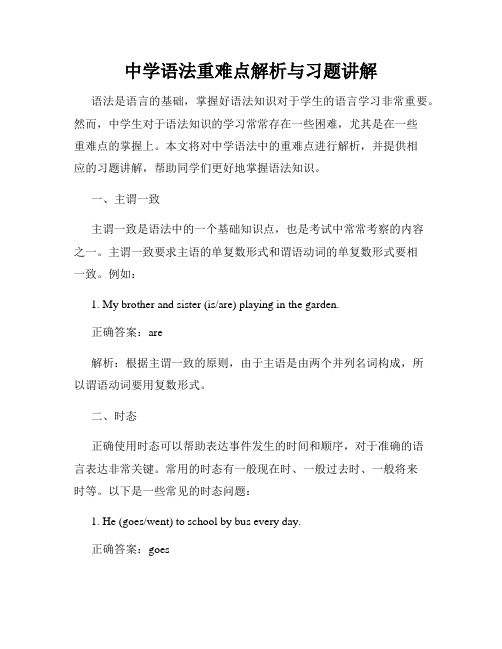
中学语法重难点解析与习题讲解语法是语言的基础,掌握好语法知识对于学生的语言学习非常重要。
然而,中学生对于语法知识的学习常常存在一些困难,尤其是在一些重难点的掌握上。
本文将对中学语法中的重难点进行解析,并提供相应的习题讲解,帮助同学们更好地掌握语法知识。
一、主谓一致主谓一致是语法中的一个基础知识点,也是考试中常常考察的内容之一。
主谓一致要求主语的单复数形式和谓语动词的单复数形式要相一致。
例如:1. My brother and sister (is/are) playing in the garden.正确答案:are解析:根据主谓一致的原则,由于主语是由两个并列名词构成,所以谓语动词要用复数形式。
二、时态正确使用时态可以帮助表达事件发生的时间和顺序,对于准确的语言表达非常关键。
常用的时态有一般现在时、一般过去时、一般将来时等。
以下是一些常见的时态问题:1. He (goes/went) to school by bus every day.正确答案:goes解析:根据句子中的每天,可以判断动作是经常性的,所以要使用一般现在时。
三、从句从句是由连接词引导的句子,分为名词性从句、形容词性从句和副词性从句。
从句在句子中起着修饰或者补充说明的作用。
以下是一些常见的从句问题:1. I don't know (where/when) he will come back.正确答案:when解析:根据句子的意思,问句是关于时间的,所以要用when引导时间状语从句。
四、非谓语动词非谓语动词包括动词不定式、动名词和分词,常常用于做主语、宾语、表语等。
以下是一些常见的非谓语动词问题:1. She enjoys (read/reading) novels in her free time.正确答案:reading解析:enjoy后面接动名词形式,表示喜欢做某件事情,所以要用reading。
五、固定搭配固定搭配是指一些词语在使用中具有固定的搭配关系,不能随意变换。
初中英语语法讲解及练习和答案
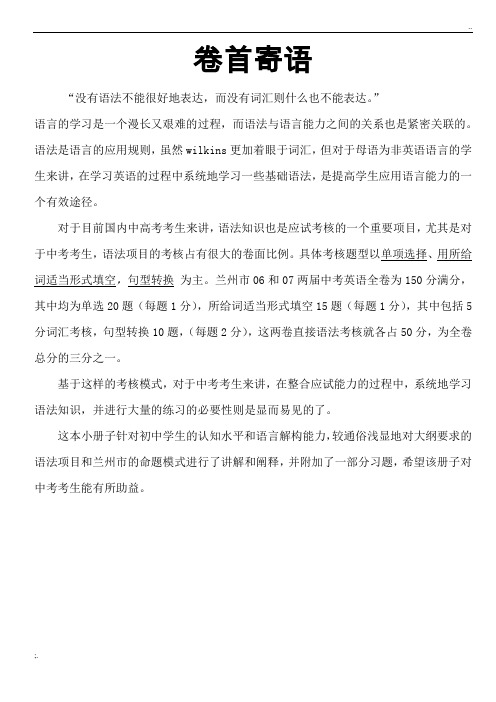
卷首寄语“没有语法不能很好地表达,而没有词汇则什么也不能表达。
”语言的学习是一个漫长又艰难的过程,而语法与语言能力之间的关系也是紧密关联的。
语法是语言的应用规则,虽然wilkins更加着眼于词汇,但对于母语为非英语语言的学生来讲,在学习英语的过程中系统地学习一些基础语法,是提高学生应用语言能力的一个有效途径。
对于目前国内中高考考生来讲,语法知识也是应试考核的一个重要项目,尤其是对于中考考生,语法项目的考核占有很大的卷面比例。
具体考核题型以单项选择、用所给词适当形式填空,句型转换为主。
兰州市06和07两届中考英语全卷为150分满分,其中均为单选20题(每题1分),所给词适当形式填空15题(每题1分),其中包括5分词汇考核,句型转换10题,(每题2分),这两卷直接语法考核就各占50分,为全卷总分的三分之一。
基于这样的考核模式,对于中考考生来讲,在整合应试能力的过程中,系统地学习语法知识,并进行大量的练习的必要性则是显而易见的了。
这本小册子针对初中学生的认知水平和语言解构能力,较通俗浅显地对大纲要求的语法项目和兰州市的命题模式进行了讲解和阐释,并附加了一部分习题,希望该册子对中考考生能有所助益。
Contents第一部分语法讲解第一讲词类、句子成分、构词法 (3)第二讲名词 (4)第三讲代词 (6)第四讲数词 (9)第五讲冠词 (10)第六讲形容词和副词 (12)第七讲介词 (19)第八讲动词(一)动词概述 (21)第九讲动词(二)动词时态和语态 (25)第十讲动词(三)非谓语动词及动词辨析 (29)第十一讲连词 (35)第十二讲简单句 (36)第十三讲句子成分 (39)第十四讲简单句句式 (42)第十五讲并列句和主从复合句 (43)第二部分巩固与提高测评测评一名词 (47)测评二代词 (48)测评三数词 (51)测评四冠词 (52)测评五形容词和副词 (54)测评六介词 (58)测评七动词 (60)测评八连词 (69)测评九句子 (70)测评十交际用语 (75)第三部分语法网络图第一讲:词类、句子成分和构词法:1、词类:英语词类分十种:名词、形容词、代词、数词、冠词、动词、副词、介词、连词、感叹词。
初中英语语法重难点及应用讲解
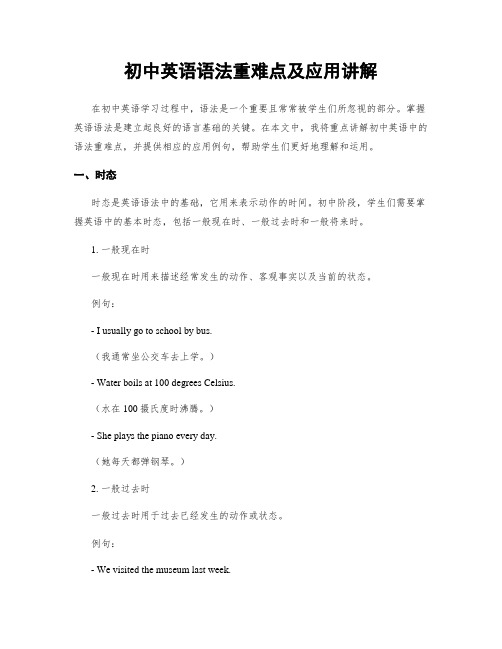
初中英语语法重难点及应用讲解在初中英语学习过程中,语法是一个重要且常常被学生们所忽视的部分。
掌握英语语法是建立起良好的语言基础的关键。
在本文中,我将重点讲解初中英语中的语法重难点,并提供相应的应用例句,帮助学生们更好地理解和运用。
一、时态时态是英语语法中的基础,它用来表示动作的时间。
初中阶段,学生们需要掌握英语中的基本时态,包括一般现在时、一般过去时和一般将来时。
1. 一般现在时一般现在时用来描述经常发生的动作、客观事实以及当前的状态。
例句:- I usually go to school by bus.(我通常坐公交车去上学。
)- Water boils at 100 degrees Celsius.(水在100摄氏度时沸腾。
)- She plays the piano every day.(她每天都弹钢琴。
)2. 一般过去时一般过去时用于过去已经发生的动作或状态。
例句:- We visited the museum last week.(我们上周参观了博物馆。
)- She studied English for two hours yesterday.(她昨天学习英语学习了两个小时。
)- They lived in New York for five years.(他们在纽约居住了五年。
)3. 一般将来时一般将来时用来表示将要发生的动作或状态。
例句:- We will have a party next Saturday.(我们下周六将举办一场派对。
)- She is going to visit her grandparents tomorrow.(她明天要去拜访她的祖父母。
)- They are leaving for London next month.(他们下个月将前往伦敦。
)二、被动语态被动语态在英语中是一种常见的语法结构。
它用于句子的主语接受动作,而不是执行动作。
被动语态的构成需要使用be动词的不同形式+动词的过去分词形式。
初中英语语法重难点解析与演练
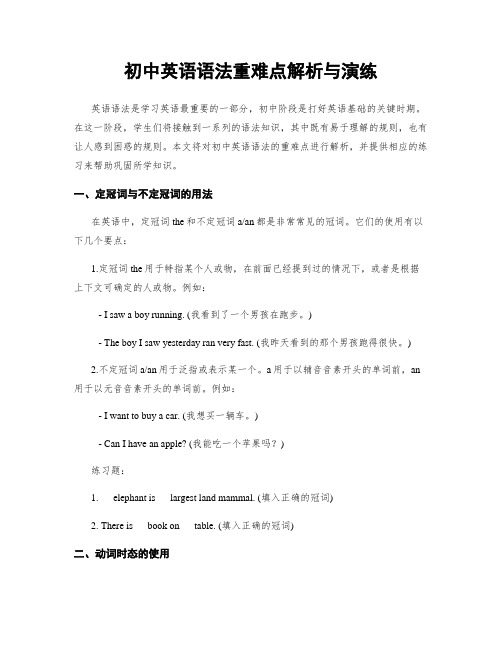
初中英语语法重难点解析与演练英语语法是学习英语最重要的一部分,初中阶段是打好英语基础的关键时期。
在这一阶段,学生们将接触到一系列的语法知识,其中既有易于理解的规则,也有让人感到困惑的规则。
本文将对初中英语语法的重难点进行解析,并提供相应的练习来帮助巩固所学知识。
一、定冠词与不定冠词的用法在英语中,定冠词the和不定冠词a/an都是非常常见的冠词。
它们的使用有以下几个要点:1.定冠词the用于特指某个人或物,在前面已经提到过的情况下,或者是根据上下文可确定的人或物。
例如:- I saw a boy running. (我看到了一个男孩在跑步。
)- The boy I saw yesterday ran very fast. (我昨天看到的那个男孩跑得很快。
)2.不定冠词a/an用于泛指或表示某一个。
a用于以辅音音素开头的单词前,an 用于以元音音素开头的单词前。
例如:- I want to buy a car. (我想买一辆车。
)- Can I have an apple? (我能吃一个苹果吗?)练习题:1. __ elephant is __ largest land mammal. (填入正确的冠词)2. There is __ book on __ table. (填入正确的冠词)二、动词时态的使用动词时态在英语语法中是一个非常重要且常见的知识点。
在初中阶段,学生们需要掌握以下几个时态的用法:1.一般现在时: 表示经常性的动作、现在的状态或客观事实。
例如:- I go to school every day. (我每天去学校。
)- Water boils at 100 degrees Celsius. (水在100摄氏度沸腾。
)2.一般过去时: 表示过去发生或完成的动作。
例如:- Yesterday, I went to the park with my friends. (昨天我和朋友们一起去了公园。
初中英语语法知识难点大全3
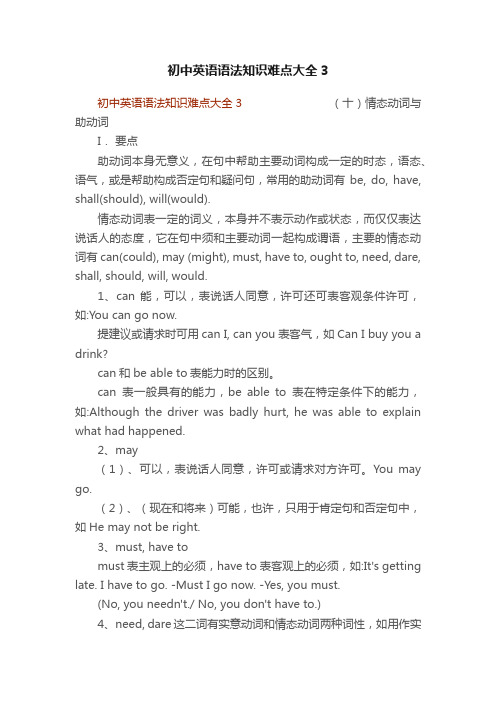
初中英语语法知识难点大全3初中英语语法知识难点大全3 (十)情态动词与助动词I.要点助动词本身无意义,在句中帮助主要动词构成一定的时态,语态、语气,或是帮助构成否定句和疑问句,常用的助动词有be, do, have, shall(should), will(would).情态动词表一定的词义,本身并不表示动作或状态,而仅仅表达说话人的态度,它在句中须和主要动词一起构成谓语,主要的情态动词有can(could), may (might), must, have to, ought to, need, dare, shall, should, will, would.1、can 能,可以,表说话人同意,许可还可表客观条件许可,如:You can go now.提建议或请求时可用can I, can you表客气,如Can I buy you a drink?can和be able to表能力时的区别。
can表一般具有的能力,be able to表在特定条件下的能力,如:Although the driver was badly hurt, he was able to explain what had happened.2、may(1)、可以,表说话人同意,许可或请求对方许可。
You may go.(2)、(现在和将来)可能,也许,只用于肯定句和否定句中,如He may not be right.3、must, have tomust表主观上的必须,have to表客观上的必须,如:It's getting late. I have to go. -Must I go now. -Yes, you must.(No, you needn't./ No, you don't have to.)4、need, dare这二词有实意动词和情态动词两种词性,如用作实意动词后接动词不定式to do,如用作情态动词后接动词原形。
初中英语语法重难点梳理与剖析 (2)

总结:介词和连词的用法混淆是常见的英语语法错误,需要特别注意并 加以纠正
主谓不一致:常见于动词be、助动词have、情态动词can/may/must等, 需根据主语的人称和时态进行变化。
善于总结,掌 握规律
总结语法规则:将复杂的语法知识总结成简单的规律,方便记忆和理 解。
归纳常用表达:将常用的英语表达进行归纳整理,提高英语表达能 力。
掌握句型结构:通过分析句型结构,深入理解英语语法的特点,提高 阅读和写作能力。
实践练习:通过大量的实践练习,不断巩固和加深对英语语法的理 解和运用。
情态动词表示说话人的语气和态度,如“can”、“may”、 “must”等。
助动词帮助主要动词构成时态、语态、否定和疑问等,如“do”、 “be”、“have”等。
情态动词和助动词在英语语法中具有重要地位,是理解和运用英语的 基础。
掌握情态动词和助动词的用法,有助于提高英语口语和写作能力。
定义:宾语从句是句子在复合句 中充当宾语,状语从句是句子在 复合句中充当状语
精选练习题,针 对重难点进行练 习
注重解题技巧, 提高解题效率
及时总结错题, 深入剖析原因
多做真题模拟, 强化实战能力
仔细审题,明确题意。 回忆所学,找出与题意相关的知识点。 选出最佳答案,注意排除干扰选项。 答题要完整、规范。
结合语境选择最合适的选项 理解文章主旨和结构
注意固定搭配和习惯用法
添加标题
添加标题
添加标题
添加标题
强调句型的用法:用于强调句子 的某一成分,使句子意思更加明 确
初中英语语法难点解析及考点分析 (2)

解题技巧:对于动词时态和语态的题目,学 生应该先判断题目所使用的时态和语态,然 后根据语境选择正确的形式。
添加 标题
易错点总结:学生在使用动词时态和语态时, 容易出现时态不一致、语态错误等问题,需 要加强练习和巩固。
名词的复数形式及所有格
规则变化:一般情况下,直接在 名词后面加“s”
特殊变化:如man的复数为men, woman的复数为women
掌握虚拟语气:虚拟语气是初中英语语法的难点之一,学生需要掌握虚拟语气的基本用法和变化 规则。
阅读理解和写作技巧
阅读理解:掌握文章主旨,理解作者意图,提高阅读速度和准确度 写作技巧:注重语言规范,掌握常见文体的写作方法,提高表达能力
初中英语语法难点解析及考点 分析方法
章节副标题
结合教材和考试大纲,梳理出重点和难点
定冠词:用于 限定名词,表 示特指。例如: “the car”表示
“这辆车”。
初中英语考点分析
章节副标题
句子结构的理解和组织
掌握基本句型和句子成分 理解复合句子的结构和逻辑 学会分析句子结构,提高阅读理解能力 掌握句子组织的规则和技巧,提高写作表达能力
词汇的辨析和运用
近义词辨析:初中英语中常见的近义词及其用法比较,如“big”和“large”等。
结合教材:深入研究教材,把握知识体系和结构 考试大纲:分析考试大纲,明确考试要求和考点 梳理重点:根据教材和考试大纲,确定重点知识点 难点解析:针对难点,进行深入解析和讲解
通过练习题和模拟试题,加深对知识点的理解 和运用
练习题:针对每个语法点设计练习题,帮助学生巩固所学知识。
模拟试题:模拟中考试卷,让学生熟悉考试形式,提高应试能力。
添加标题
添加标题
- 1、下载文档前请自行甄别文档内容的完整性,平台不提供额外的编辑、内容补充、找答案等附加服务。
- 2、"仅部分预览"的文档,不可在线预览部分如存在完整性等问题,可反馈申请退款(可完整预览的文档不适用该条件!)。
- 3、如文档侵犯您的权益,请联系客服反馈,我们会尽快为您处理(人工客服工作时间:9:00-18:30)。
初中英语语法知识难点解析(附典题详解及检测附答)英语语法知识难点(一)II.例题(一)形容词和副词I.要点A.形容词1、形容词的用法形容词是用来修饰、描绘名词的,通常在句中作定语、表语或宾补,有时还可作状语。
如:He is honest and hardworking.I found the book interesting.某些形容词与定冠词连用表示一类人作主语时,谓语通常用复数形式。
如:The rich and the poor live in different parts of the city.The English like to be with their families.多个形容词作定语修饰名词的顺序:冠词+序数词+基数词+性质状态(描述性)+形状大小+新旧老少+颜色+国籍+材料+名词。
如:the second five interesting big new red Chinese wall papers.2、形容词比较等级的形式(1)规则形式一般说来,单音节词及少数双音节词在后加-er; --est 来构成比较级和最高级;其他双音节词及多音节词在前加more, most.如:great-greater-greatestbusy-busier-busiestimportant-more important-(the)most important(2)不规则形式good (well)-better-bestbad (ill)-worse-worstmany (much)-more-mostlittle-less-least(3)形容词比较等级的用法①表示两者的比较,用形容词的比较级+than. 如:He is cleverer than the other boys.This one is more beautiful than that one.②表示两者以上的比较,用"the +形容词最高级(+名词)+of(in) …"如:He is the cleverest boy in his class.③表示两者是同等程度,用"as +形容词原级+as". 如:He is as tall as I.I have as many books as you.④越… 越…例如:The more I learn, the happier I am.⑤ You can never be too careful. 越小心越好又如:You can never praise the teacher too highly.你怎么赞扬这个老师也不过分。
⑥ I have never spent a more worrying day.那一天是最令我担心的一天。
I have never had a better dinner.这是我吃过的最好的一顿饭。
⑦ My English is no better than yours.我的英语和你的英语都不怎么样。
B.副词1、副词的种类(1)时间副词如:ago, before, already, just, now, early, late, finally, tomorrow等(2)地点副词如:here, there, near, around, in, out, up, down, back, away, outside等。
(3)方式副词如:carefully, angrily, badly, calmly, loudly, quickly, politely, nervously等。
(4)程度副词如:almost, nearly, much, greatly, a bit, a little, hardly, so, very等。
2、副词比较等级的用法其用法与形容词相似,只是副词最高级前可省略定冠词。
如:Of all the boys he sings (the) most beautifully.We must work harder.3、某些副词在用法上的区别(1) already, yet, stillalready表示某事物已经发生,主要用于肯定句;yet表示期待某事发生,主要用于否定句和疑问句;still表示某事还在进行,主要用于肯定句和疑问句,有时也可用于否定句。
如:We've already watched that film.I haven't finished my homework yet.He still works until late every night.(2) too, as well, also, eithertoo, as well和 also用于肯定句和疑问句,too和as well多用于口语,一般放在句末,而also多用于书面语,一般放在句中与动词连用。
either用于否定句和否定的疑问句,往往放在句末。
如:He went there too.He didn't go there either.I like you as well.I also went there.(3) hard, hardlyhardly意为"几乎"与hard在词义上完全不同。
如:I work hard every day.I can hardly remember that.(4) late, latelylately意为"最近、近来",late意为"晚、迟"。
如:He never comes late.Have you been to the museum lately?例1 Tom's father thinks he is already ____A high enoughB tall enoughC enough high C enough tall解析:该题正确答案是B。
修饰人高用tall, 而建筑物的高用high,并且enough修饰形容词要放在形容词后面。
因此该题选B。
例2 ____ the worse I seem to be.A When I take more medicineB The more medicine I takeC Taking more of the medicineD More medicine taken解析:该题正确答案为B。
"the+形容词比较级+… , the +形容词比较级+…"意为越…,越…。
该句意为:吃的药越多,我的病越是加重。
例3"I haven't been to London yet"."I haven't been there ____".A tooB alsoC eitherD neither解析:该题正确答案为C。
A和B都用于肯定句中。
D-neither本身意为否定"两者都不",而C-either则用于否定句中,意为"也"。
例4 Mr Smith was ____ moved at the news.A deepB deeplyC very deepD quite deeply解析:该题正确答案为B。
A. deep用于副词时,修饰具体的深,如dig deep,而B-deeply则修饰表示感情色彩的词,如该题为deeply moved.另如deeply regret等。
而D-quite和deeply均为副词,不能互相修饰。
(二)介词I.要点1、介词和种类(1)简单介词,常用的有at, in, on, about, across, before, beside, for , to, without等。
(2)复合介词,如by means of, along with, because of, in front of, instead of等。
2、介词和其他词类的习惯搭配关系(1)和动词的搭配,如agree with, ask for, belong to, break away from, care about等。
(2)和形容词的搭配,如afraid of, angry with, different from, good at(3)和名词的搭配,如answer to , key to, reason for, cause of, visit to等.3、介词短语可以有自己的修饰语,这种修饰语通常有right, just, badly, all, well, directly, completely 等少数几个副词。
如:He came right after dinner.He lives directly opposite the school.4、某些介词的意义与用法举例(1) at, on, in(表时间)表示时间点用at,如at four o'clock, at midnight 等;表示不确定的时间或短期假日也用at,如at that time, at Christmas等。
指某天用on, 如on Monday, on the end of November, 指某天的朝夕用on,如on Friday morning, on the afternoon of September lst等。
指长于或短于一天的时段用in,如in the afternoon, in February, in Summer, in 1999等。
(2) between, among(表位置)between仅用于二者之间,但说三者或三者以上中的每两个之间的相互关系时,也用between, 如I'm sitting between Tom and Alice.The village lies between three hills.among用于三者或三者以上之间。
如:He is the best among the students.(3) beside, besidesbeside意为"在…旁边",而besides意为"除…之外"。
如:He sat beside me.What do you want besides this?(4)in the tree, on the treein the tree 指动物或人在树上,而on the tree 指果实、树叶长在树上(5)on the way, in the way, by the way, in this wayon the way 指在路上 in the way 指挡道by the way 指顺便问一句 in this way 用这样的方法(6)in the corner, at the cornerin the corner 指在拐角内 at the corner 指在拐角外(7)in the morning, on the morningin the morning 是一般说法 on the morning 特指某一天的早晨(8)by bus, on the busby bus 是一般说法 on the bus 特指乘某一辆车II.例题例1 Do you know any other foreign language____ English?A exceptB butC besideD besides解析:A、B两项except等于but,意为"除了…",C-beside意为"在…旁边",不符合题意。
